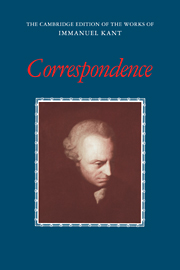Book contents
- Frontmatter
- Contents
- General Editors' Preface
- Acknowledgments
- Introduction
- Letters before 1770
- 1749
- 1759
- 1762
- 1763
- 1765
- 1766
- 1768
- 1769
- Letters 1770–1780
- Letters 1781–1789
- Letters 1790–1794
- Letters 1795–1800
- Public Declaration concerning Fichte's Wissenschaftslehre, August 7, 1799
- Biographical Sketches
- Glossary
- Index of Persons
1766
from Letters before 1770
Published online by Cambridge University Press: 07 September 2010
- Frontmatter
- Contents
- General Editors' Preface
- Acknowledgments
- Introduction
- Letters before 1770
- 1749
- 1759
- 1762
- 1763
- 1765
- 1766
- 1768
- 1769
- Letters 1770–1780
- Letters 1781–1789
- Letters 1790–1794
- Letters 1795–1800
- Public Declaration concerning Fichte's Wissenschaftslehre, August 7, 1799
- Biographical Sketches
- Glossary
- Index of Persons
Summary
Dear Sir,
I am in every way obliged to you for your most treasured letter of December 31 and should like especially to render my sincerest thanks for your efforts in connection with Herr Kanter. If it suits him I should be very pleased to see him here at Easter and to make the necessary appointments with him. I shall also have various matters to discuss with him in connection with the calendar revision that I have undertaken for the Academy. Might I beg you, sir, to inform Herr Kanter of all this when you have time. I have nothing else to say in answer to his letter. But do think up ways in which, perhaps because of my location [in Berlin], I can be of service to you, so that I shall not remain your debtor.
There is no denying it: whenever a science needs methodical reconstruction and cleansing, it is always metaphysics. The universal, which is supposed to reign in that science, leads us to suppose ourselves omniscient, and thus we venture beyond the limits of possible human knowledge. I think this shows that if we want to avoid omissions, premature inferences, and circular reasoning, we had better work piecemeal, demanding to know at every step only what is capable of being known. I think it has been an unrecognized but perennial error in philosophy to force the facts and, instead of leaving anything unexplained, to load up with conjectures, thus actually delaying the discovery of the truth.
- Type
- Chapter
- Information
- Correspondence , pp. 84 - 93Publisher: Cambridge University PressPrint publication year: 1999

